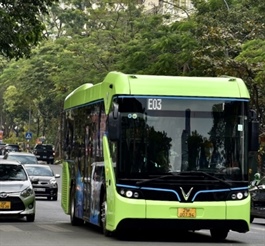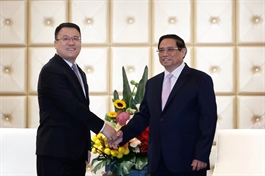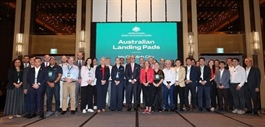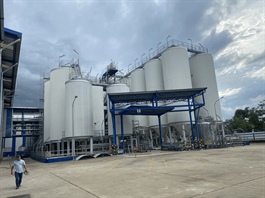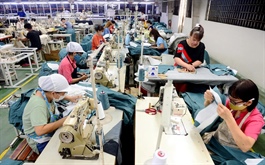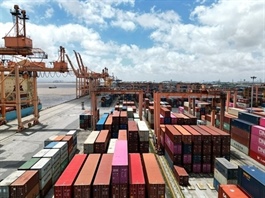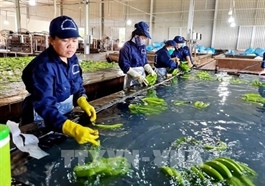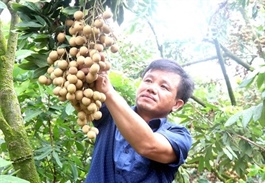Vietnam textile and garment industry taking EU regulations more seriously
Vietnam textile and garment industry taking EU regulations more seriously
Vietnamese textile and garment businesses are approaching new solutions to fully benefit from the transition to green production in line with ever tougher regulations.

As CEO of IoTeamVN, Nguyen Hoang Minh worked with 30-40 companies in construction materials, manufacturing, and industrial parks on energy management solutions. However, since early 2023, he has been working with Vietnam Textile and Garment Group (Vinatex).
“We are providing solutions to three subsidiaries of Vinatex, including its Nam Dinh spinning factory. The solutions can accurately monitor and analyse detailed data on energy usage at construction sites. The system then issues warnings when energy loss or waste occurs, helping optimise energy more effectively and economically,” Minh said.
The EU requires Vietnamese exports to meet the environmental requirements of the European Green Deal, the bloc’s strategy aiming to make the continent carbon neutral by 2050. In particular, the EU requires textile products to be manufactured using environmentally friendly materials and processes, as well as eco-labels on product packaging.
Since October 2023, the EU has also implemented the carbon border adjustment mechanism, which aims at imposing carbon taxes on goods imported into the market based on greenhouse gas emissions intensity in the export country’s production.
Minh, however, admitted he has had opportunities with many factories, but their readiness for the green transition is not high, although they are aware of what they need to do.
“Just 10 per cent are doing the green transition, 50 per cent have made first actions, and about 40 per cent are considering it,” he said.
The Nam Dinh factory aims to become more price-competitive, while reducing yarn production costs in comparison with India, Bangladesh, and Pakistan, and meet green production needs of the US, the EU, Japan, and South Korea.
At a demo day held in Hanoi on June 17 jointly implemented by GIZ and the National Innovation Centre (NIC), several pilot projects on green technology for Vietnamese garments and textiles exporters were showcased, such as IoTeamVN’s energy management solution, Enedig Kft’s cloud-based labour cost calculations, Hoang Ha’s waste heat recovery, and BlockTexx’s polyester and cellulose recycling.
The Green Tech Landing Pad initiative, which the demo day was part of, has successfully connected nine new technological solutions with seven garments and textiles export companies to address common technical issues, including sludge treatment, heat recovery, fabric recycling, energy optimisation, labour management, and new sustainable materials.
NIC director Vu Quoc Huy said the initiative played a crucial role in the context of the environmental and sustainability challenges that the garment and textile industry is facing.
“Through this initiative, we equip garments and textiles enterprises with cutting-edge and eco-friendly technologies, solutions, and production models. This enhances competitiveness and drives Vietnam’s garments industry’s towards sustainability,” Huy said.
Elsewhere, Faslink, Thinh Phuc, and Kyungbang are among a few companies in the industry adopting green technologies to ensure compliance with European sustainability standards. For instance, Faslink, a pioneer in providing sustainable fashion products in the Vietnamese domestic market, is using the green solutions of Ecosoi.
The latter, which was established in 2021, is the pioneer and largest supplier of pineapple fiber, yarn, and fabric in Vietnam. Its partners come from South Korea, China, Taiwan, and Japan, and its services include providing raw materials for sustainable fashion, furniture, and providing yarn and fabric original equipment manufacturer services.
Vu Thi Lieu, Ecosoi co-founder, explained that pineapple fiber is a 100 per cent natural, environmentally friendly material. “There are many applications of pineapple yarn for woven goods, but not yet for knitting. The demand for knitted clothing is increasing due to its comfortability and versatility,” she said. “The process of recycling pineapple leaves instead of burning them helps reduce CO2 emissions and environmental pollution, contributing to reducing the greenhouse effect and climate change.”
Nonetheless, textile and garment enterprises face technical challenges in their transition to green and sustainable practices to comply with EU standards and seize growth opportunities.
Tarek Hassan, head of the Digital Transformation Centre in Vietnam for the German Development Agency (GIZ), said that there were some problems facing Vietnam’s textile industry in green transformation in compliance with European sustainability standards.
“Implementing cutting-edge technologies like automation, 3D printing, and advanced dyeing processes often requires significant upfront investments. This can be a barrier for smaller companies with limited resources,” Hassan said. “Moreover, new technologies may not always deliver immediate return on investment, making it difficult for companies to justify the initial investment, especially in a competitive market.”
He added that a lack of skilled workforce was the other challenge. Operating and maintaining sophisticated machinery and digital tools requires a skilled workforce with specialised knowledge. The current textile industry workforce might not be equipped with the necessary skills to handle advanced technologies, Hassan added. “Existing infrastructure in some textile production hubs also might not be able to support the power requirements or specific needs of advanced machinery. And upgrades to electrical grids, waste management systems, and logistics might be necessary,” he said.
Minh of IoTeamVN expanded on the problem. “The EU has many technical requirements for importers related to environment protection, green agriculture, traceability, and others. This requires comprehensive changes from material area, reservation, and exports. They cannot do this overnight, but making a roadmap takes a lot of time. Vietnamese garments and textiles factories are still just the beginning,” he said.




